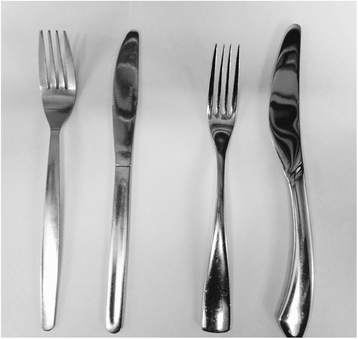I don't like dainty coffee cups or a salad fork and I like a heavy blanket. Though recent trends had been toward smaller and lighter, I am not alone in preferring heft. People have started to love weighty stuff again.
It's not just blankets and old Griswold skillets, a study even found that heavier utensils enhanced enjoyment of meals.

On the left, the ‘canteen’ cutlery; on the right, the ‘banquet’ cutlery
This makes some common psychological sense. If I go into a restaurant and the forks look cheap, I don't care how much they charge, I don't think I am getting a good value. But if I have a heavy water glass and a knife that looks like it came out of a medieval kitchen, that smacks of greater quality.
Yet there is no reason for most people to feel that way.
Yet the authors correlated heavier cutlery to how well-plated the main course was regarded, how much people liked the food, and therefore how much the 134 participants in the experiment would be willing to pay.
If gastrophysics and food-extrinsic factors skew our perception of our dining experience, even how a meal tastes, it is plausible we are deceiving ourselves about other things. It would certainly explain why organic food shoppers think their food is somehow healthier because it uses older, less-effective pesticides.
(1) Whole Foods founder John Mackey must be in a panic, because he recently reiterated his long-debunked 'food is medicine' mumbo-jumbo to offset the surging interest in affordable food, and chemicals like Purell and Clorox rather than useless "green" substitutes. Don't be concerned I might have offended some anti-science hippie. They don't read science sites.




Comments